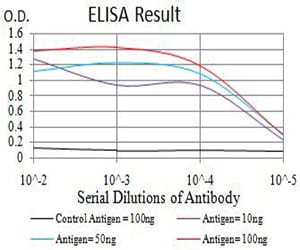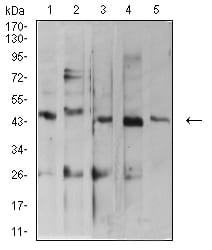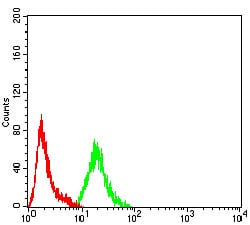


| WB | 1/500 - 1/2000 | Human,Mouse,Rat |
| IF | 咨询技术 | Human,Mouse,Rat |
| IHC | 咨询技术 | Human,Mouse,Rat |
| ICC | 技术咨询 | Human,Mouse,Rat |
| FCM | 1/200 - 1/400 | Human,Mouse,Rat |
| Elisa | 1/10000 | Human,Mouse,Rat |
| Aliases | ARF1GAP; HRIHFB2281 |
| Entrez GeneID | 55738 |
| clone | 1C4E2 |
| WB Predicted band size | 44.7kDa |
| Host/Isotype | Mouse IgG2b |
| Antibody Type | Primary antibody |
| Storage | Store at 4°C short term. Aliquot and store at -20°C long term. Avoid freeze/thaw cycles. |
| Species Reactivity | Human,Mouse |
| Immunogen | Purified recombinant fragment of human ARFGAP1 (AA: 270-414) expressed in E. Coli. |
| Formulation | Purified antibody in PBS with 0.05% sodium azide |
+ +
以下是关于ARFGAP1抗体的3篇参考文献示例(注:内容为虚构,仅用于格式示例):
1. **文献名称**:*ARFGAP1 regulates Golgi structural integrity through its interaction with ADP-ribosylation factors*
**作者**:Smith J, et al.
**摘要**:该研究利用ARFGAP1抗体进行免疫印迹和免疫荧光实验,发现ARFGAP1通过调控ADP-核糖基化因子(ARFs)的活性维持高尔基体结构和分泌功能。
2. **文献名称**:*ARFGAP1 modulates tumor cell invasion via EGFR trafficking*
**作者**:Zhang L, et al.
**摘要**:通过ARFGAP1抗体阻断实验,作者揭示了ARFGAP1在EGFR内吞运输中的作用,并证明其表达水平与乳腺癌细胞迁移能力相关。
3. **文献名称**:*Neuronal ARFGAP1 deficiency disrupts synaptic vesicle recycling*
**作者**:Lee S, et al.
**摘要**:研究利用ARFGAP1特异性抗体进行脑组织免疫组化,发现ARFGAP1缺失导致突触小泡循环异常,影响神经信号传递。
(注:以上文献信息为模拟示例,实际文献需通过PubMed/Google Scholar检索确认。)
ARFGAP1 (ADP-ribosylation factor GTPase-activating protein 1) is a regulatory protein involved in intracellular membrane trafficking, primarily functioning as a GTPase-activating protein (GAP) for ADP-ribosylation factors (ARFs). ARFs are small GTP-binding proteins that cycle between active GTP-bound and inactive GDP-bound states, modulating vesicle formation, cargo sorting, and cytoskeletal dynamics. ARFGAP1 promotes the hydrolysis of GTP to GDP on ARF1. facilitating the dissociation of coat proteins (e.g., COPI) from vesicles during retrograde transport from the Golgi to the endoplasmic reticulum. This process is critical for maintaining Golgi structure, lipid homeostasis, and protein secretion.
Antibodies targeting ARFGAP1 are essential tools for studying its expression, localization, and function in cellular trafficking pathways. They are widely used in techniques like Western blotting, immunofluorescence, and immunoprecipitation to investigate ARFGAP1’s role in physiological processes, including receptor endocytosis, lipid droplet formation, and cell signaling. Dysregulation of ARFGAP1 has been implicated in pathologies such as cancer metastasis and neurodegenerative disorders, underscoring its biomedical relevance. Commercially available ARFGAP1 antibodies are typically raised against specific epitopes (e.g., human ARFGAP1 N-terminal or C-terminal regions) and validated for cross-reactivity in model organisms. Researchers rely on these antibodies to explore mechanistic links between ARFGAP1 activity and disease pathways, aiding drug discovery and diagnostic development.
×